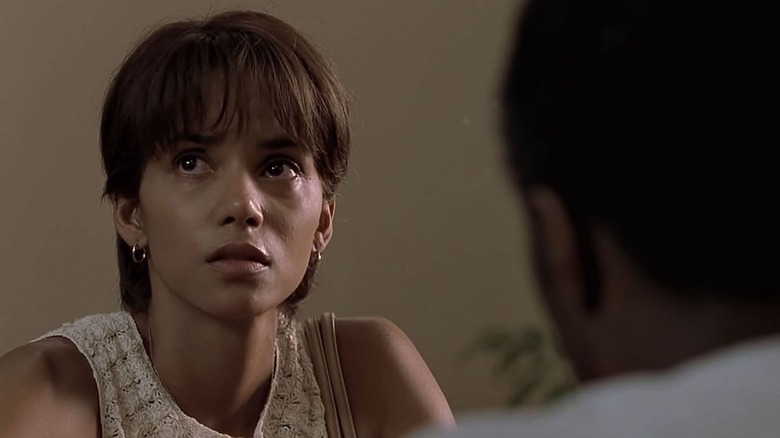
In Marc Forster’s 2001 drama “Monster’s Ball,” Halle Berry plays Leticia Musgrove, a woman at the end of her rope. Her husband has been convicted of murder and is executed by the state of Georgia early in the film. Leticia is trying to put her life back together when her son Tyrell (Coronji Calhoun) is hit by a car and dies. Leticia can only find comfort in the arms of a gruff prison warden named Hank (Billy Bob Thornton), whose own son (Heath Ledger) recently died by suicide. What Leticia doesn’t know, however, is that Hank oversaw her husband’s execution. It’s all very complicated, but handled tactfully and with the utmost sensitivity. “Monster’s Ball” is a pretty great film.
Berry won the Oscar for Best Actress for playing Leticia at the 2002 Academy Awards ceremony, beating out Judi Dench, Nicole Kidman, Sissy Spacek, and Renée Zellweger. Her victory was well-deserved.
She was only the seventh Black woman to have been nominated for Best Actress at the Oscars. Previous nominees included Dorothy Dandridge (for “Carmen Jones” in 1954), Diana Ross (for “Lady Sings the Blues” in 1972), Cicely Tyson (for “Sounder,” also in 1972), Diahann Carol (for “Claudine” in 1974), Whoopi Goldberg (for “The Color Purple” in 1985), and Angela Bassett (for “What’s Love Got to Do With It?” in 1993). Berry was also the first to actually win in the category. It was a banner moment for Black women everywhere, and a “finally!” moment for the Academy.
Another notable record was broken that year as well. Because Denzel Washington won Best Actor for his controversy sparking role in Antoine Fuqua’s “Training Day,” the 2002 Oscars marked the first time that Black actors won the two top acting awards in the same night.
Since Berry won, however, no other Black women have won in the Best Actress Oscar category. Since 2002, only six additional Black women have even been nominated (one of them twice), but none of them have taken home a statuette. Berry still holds the record.
No Black woman has won the Best Actress Oscar since 2002
Since 2002, the following six Black women have been considered for Best Actress. Gabourey Sidibe was nominated in 2009 for playing the titular role in Lee Daniels’ “Precious.” Viola Davis was nominated two times, in 2011 for “The Help” and in 2020 for “Ma Rainey’s Black Bottom.” In 2012, eight-year-old Quvenzhané Wallis was nominated for “Beasts of the Southern Wild,” and she holds a record for being the youngest person ever nominated for a Best Actress Oscar. Ruth Negga was nominated in 2016 for her performance in “Loving,” and Cynthia Erivo was nominated in 2019 for playing Harriet Tubman in “Harriet.”
Most recently, Andra Day was nominated for playing Billie Holiday in Daniels’ “The United States vs. Billie Holiday.” Incidentally, Diana Ross’ nomination in 1972 was also for playing Billie Holiday.
The Academy’s Best Supporting Actress category has had more nominations for Black women, totaling 29 since 1939. Hattie McDaniel famously won Best Supporting Actress for her role in “Gone With the Wind,” and many Hollywood history buffs know that she was only allowed in the building as a special favor; the Ambassador Hotel where the Oscar ceremony was held was a segregated venue. McDaniel couldn’t join her white co-stars for the after-party because it, too, was held at a segregated venue.
Seven Black women were nominated for Best Supporting Actress after McDaniel, but none of them won until Goldberg in 1990 for her performance in the movie “Ghost.” It “only” took 50 years.
Since 2004, though, 19 films have featured nominated performances from Black women, and eight of those women have won. Most recently, Da’Vine Joy Randolph won an Oscar for playing Mary in 2023’s “The Holdovers.” Danielle Brooks was nominated that same year for playing Sofia in “The Color Purple.” Incidentally, Oprah Winfrey was nominated for the same role in the 1985 film version of “The Color Purple.”



Leave a Reply